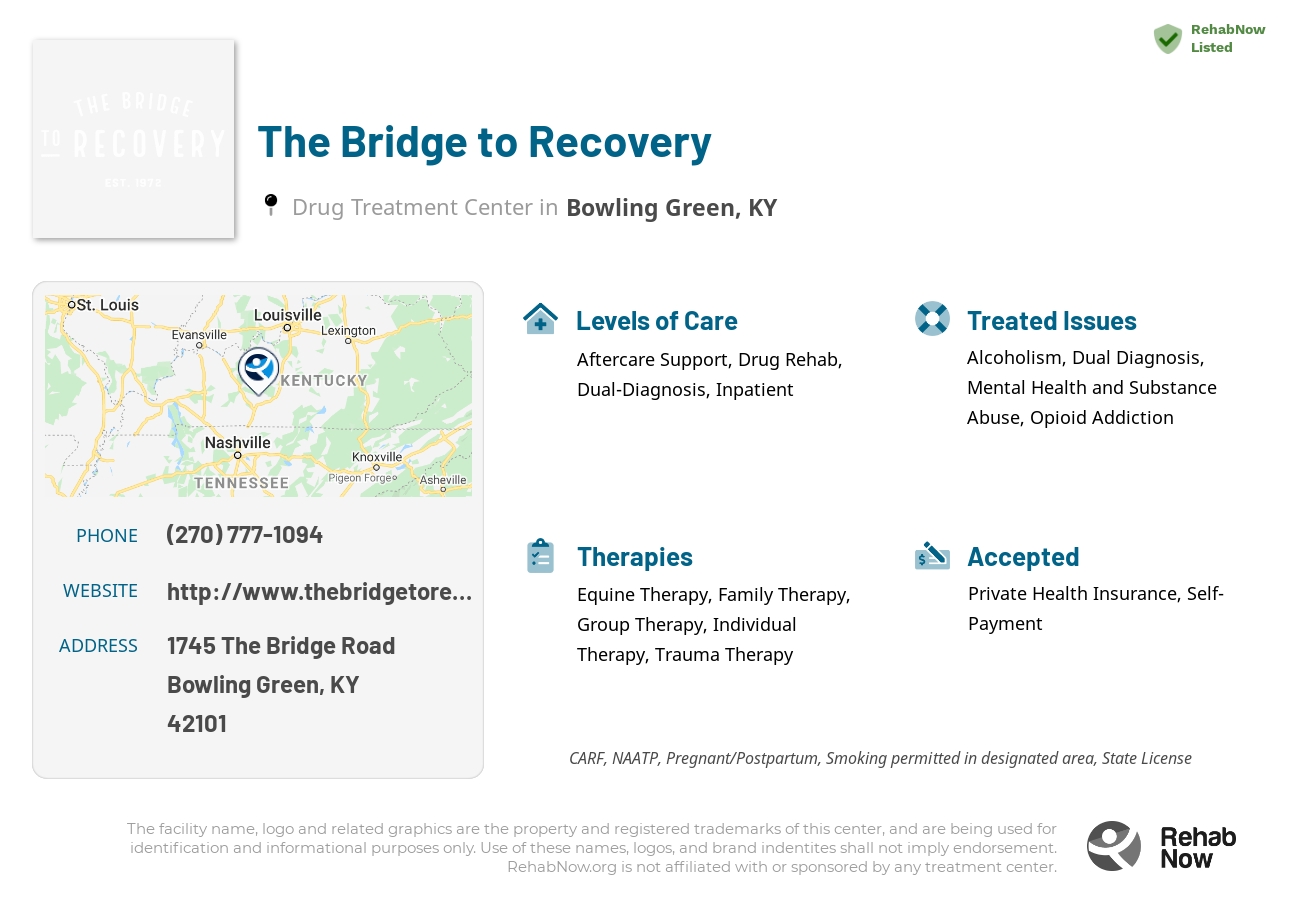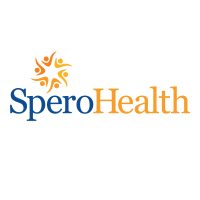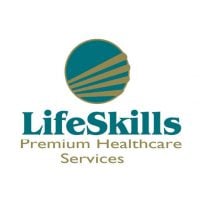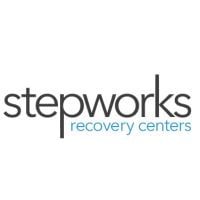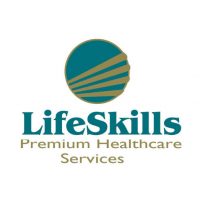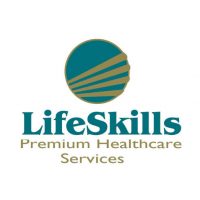The Bridge to Recovery
Drug Rehab Center in Bowling Green, Kentucky
The Bridge to Recovery Addiction Treatment Facility in Bowling Green, KY provides NAATP accredited drug rehab, dual-diagnosis treatment, inpatient levels of care, aftercare, and payment options for private health insurance to help individuals recover from substance abuse and mental health issues.
Multiple patients have reported The Bridge to Recovery as permanently closed.
Research other rehabs in Bowling Green, Kentucky, or get help finding an open facility.
About The Bridge to Recovery in Kentucky
Located in Bowling Green, Kentucky, The Bridge to Recovery is a unique co-occurring mental health and addiction treatment center. It distinguishes itself through a holistic approach guided by a compassionate team, aiming to empower men and women on a journey of recovery and self-discovery. The center is committed to fostering personal growth, healing from trauma, and developing resilience against future challenges.
- Holistic and Individualized Care: Every treatment plan is customized to meet the specific emotional and psychological needs of the client.
- Family Inclusion in Recovery: A comprehensive family program is offered to heal not just the individual but the entire family unit, recognizing the crucial role of family dynamics.
- Comprehensive Aftercare and Support: Graduates gain access to ongoing support and resources, ensuring long-term success and relapse prevention.
The Bridge to Recovery is accredited by the National Association of Addiction Treatment Providers (NAATP), reflecting its adherence to rigorous standards in addiction treatment. Programs are designed to cater to individuals facing various forms of addiction and mental health issues, with a focus on creating lasting change through evidence-based interventions and a supportive residential experience.
Specializing in the treatment of alcoholism, dual diagnosis, opioid addiction, drug addiction, and other substance abuse issues, The Bridge to Recovery offers a robust array of services. From individual and group therapy to specialized dual-diagnosis treatment and inpatient care, the center is equipped to address the complexities of each client's condition with effective treatment methodologies.
Genders
Ages
Modality
Additional
Accreditations
NAATP
Conditions and Issues Treated
Some addicts can benefit from substance abuse treatment, which is designed to help them become and remain sober without the use of medications. These programs are typically used by those struggling with drugs like marijuana or hallucinogens. However, they might be beneficial for those with a co-occurring mental health disorder like schizophrenia, major depression or bipolar disorder.
During this type of treatment, the addict will meet with therapists and other professionals on a regular basis to learn coping skills and healthy ways to deal with their addiction and mental health disorder.
Treatment programs often combine medications with counseling, support groups and even medical services like those found in hospitals or doctor’s offices. There are also detoxification services that addicts can use to get sober and avoid severe withdrawal symptoms.
Opioids are a group of drugs that include substances such as heroin, morphine, and oxycodone. These drugs activate opioid receptors in the brain, which produce pleasurable feelings. Opioid addiction occurs when drugs are abused at increasing rates or increasing amounts because the body becomes tolerant of them.
Opioid addiction is typically diagnosed when drug abuse becomes a typical behavior that interferes with an individual’s ability to function daily. The use of the substance results in consequences like legal problems.
Treatment for opioid addiction varies depending on each individual’s needs. Some treatments focus on replacing opioids with other drugs that have similar effects of reducing withdrawal symptoms. Other treatments aim to reduce the risk of relapse by providing psychological support or using more natural methods.
A drug rehab center that uses Dual Diagnosis is more likely to be successful in rehabilitating a person. Dual diagnosis helps to identify and treat any co-occurring disorders. It is essential to screen for both addiction and any untreated mental health issues. A dual diagnosis gives rehab the means to treat addiction while restoring mental and emotional health.
About 70% of patients with drug addiction have at least one other psychiatric diagnosis. Fortunately, dual diagnosis treatment is a proven model that has been highly effective.
Levels of Care Offered
This center offers a variety of custom treatment tailored to individual recovery. Currently available are Aftercare Support, Drug Rehab, Dual-Diagnosis, Inpatient, with additional therapies available as listed below.
Inpatient rehab means you live there while your addiction or co-occurring disorder is treated. Prescribed medications are used along with counseling.
This type of rehabilitation provides a drug-free environment for people who struggle with chronic/long-term addiction (or their own home). Jobs or school can be put on hold until after the stay to focus solely on recovery.
Aftercare Support in drug rehab is crucial because it helps people stay sober after treatment. Aftercare Support in drug rehab is helpful because it provides the recovering person with a support group, including family members, friends, and other peers who are also in recovery.
The benefits of Aftercare Support are that it provides a pathway that will help people get sober for life. It supports healing at all levels, physical, mental, emotional, and spiritual. Another benefit of Aftercare Support is that participants learn to maintain their sobriety through holistic methods. They learn to modify behaviors individually to have peace of mind, have positive relationships with others, and find peace on the inside.
Therapies & Programs
During individual therapy at The Bridge to Recovery in , the person in recovery meets with a therapist one on one to go over their situation and learn from past mistakes. The counselor or therapist will use this time to address the causes of addiction, triggers, and any mental issue or dual diagnosis. They will also address aftercare plans, giving them the best chances of long-term sobriety.
This therapeutic process is very intense and challenging to go through. Some clients may find it easier to open up with someone apart from their family or loved ones who understand their struggles and experience with addiction.
Family therapy is designed to help addicts get clean and sober by using what they love the most; their family. Most drug treatment centers make it mandatory that the addict’s family attend therapy sessions, which is great because having everyone there to support them makes it much easier for them to get clean. Not only are they surrounded by people who want them to get better, but everyone is there because they want the best for them, not because they feel like they have to be.
Drug addicts are often surrounded by resentful or uneducated family members who would, at times, rather see them stay addicted because it makes their own lives easier. Sometimes they don’t understand what the addiction is or how they play a part in it. They know that during and after the addict’s sobriety journey, they will face challenges and changes that they aren’t sure how to handle. This can be very tough for an addict to go through on their own, which is why it’s so important that they have the support of their family. Just because someone is an addict does not mean that they don’t deserve the love and support of those around them.
Addicts in Bowling Green, KY can find support in group therapy at The Bridge to Recovery by finding peers who understand their situation and being held accountable. They also learn to develop faith, understanding, and insight into their addiction through shared conversations.
Group Therapy is employed by drug treatment centers to provide the recovering addict with a platform to talk about their feelings and experiences. It also provides for an opportunity to learn from other addicts who have successfully overcome their addiction. It is recommended that all group members be recovering addicts for this type of therapy to work.
Trauma therapy allows people who struggled with a past trauma to face the situation and learn from it. Many people go through traumatic events at an early age that later leads them into addiction as adults. By addressing this issue during treatment at The Bridge to Recovery in [/type], you can move forward with your recovery process and take back control of your sober future, too!
Traumas are one of the most common causes of psychological disorders such as Addiction Disorder. It’s often found among those diagnosed with Addictive Disorders because traumatized individuals have strong emotions or thoughts related to their traumas, leading to addictive behaviors.
Cognitive Behavioral Therapy (CBT) helps addicts comprehend the causes of their substance abuse and the consequences that follow. The treatment’s goal is to help addicts gain self-control and maintain abstinence from drugs and alcohol over the long term. Through CBT, clients learn to recognize and avoid high-risk situations and cope with challenging situations when they arise.
Eye movement desensitization and reprocessing, or EMDR, is another therapeutic technique typically used for addiction recovery. This type of therapy works by stimulating brain activity to help the addict process past emotions without relapsing on their drug of choice.
EMDR can be particularly effective for recovering addicts who have trouble recalling the events that lead up to their addiction. By helping the addict recall these memories under safe conditions, this therapy can help reduce their risk of relapse during difficult moments.
In a 12-Step Program, peers help each other to achieve the goal of total sobriety. 12-Step Programs are available in almost every city in the United States. They’re a relatively simple set of steps that are done continuously to move through life with awareness, accountability, and honesty. The recovery technique used by Alcoholics Anonymous is the 12 step program, but it can relate to any form of addiction.
Patient Experience
Creative Arts
Creative arts therapy, or expressive therapy, is beneficial to those battling addiction. It can include writing, music, drama, art, and other forms of self-expression. It improves the patient’s emotional state and allows them to focus on something other than addiction. It allows The Bridge to Recovery to examine how their feelings and emotions play out through the creative process in Bowling Green, KY.
Recovery can be a difficult process, but it is possible to heal and move forward with the help of creative arts therapy. If you or a loved one is struggling with addiction in , , consider using creative arts therapy to help the recovery process.
Experiential Therapy at The Bridge to Recovery
Experiential therapy is a type of treatment involving immediate, intense experiences designed to manage addiction. Experiential therapy is beneficial for:
- People who are seeking to overcome an addiction but have difficulty focusing on treatment goals
- People with short attention spans due to high levels of stress or difficulty concentrating
- People who are afraid of engaging in treatment due to negative past experiences
Equine Therapy in Kentucky
Equine therapy, also known as horse therapy, involves working with horses to achieve physical, mental, emotional, and social goals. The practice has evolved to incorporate various types of equine activities for people with a wide variety of special needs. This includes individuals suffering from mental health disorders, drug and alcohol addiction issues.
Fitness Therapy
The most important part of recovering is recovering the body. Addiction can damage your health in many ways. Learning how to take care of yourself includes physical fitness. Exercise can release feel-good chemicals and can further contribute to positive self-esteem. Self-discipline can be practiced through an exercise regimen as you learn how to take care of yourself.
Studies have shown that exercise increases abstinence rates, ease withdrawal symptoms and improve depressive symptoms for those in Bowling Green, KY.Exercise is an ideal way to improve physical and mental health. To help a body heal from the damage of addiction, those undergoing treatment at The Bridge to Recovery in Bowling Green, KY are advised to engage in fitness therapy.
Payment Options Accepted
For specific insurance or payment methods please contact us.
Is your insurance accepted?
Ask an expert, call (888) 674-0062
Additional Details
Specifics, location, and helpful extra information.
Bowling Green, Kentucky 42101 Phone Number(270) 777-1094 Meta DetailsUpdated April 15, 2024
Staff Verified
The Bridge to Recovery Patient Reviews
There are no reviews yet. Be the first one to write one.
Bowling Green, Kentucky Addiction Information
Kentucky ranks among the top ten states for opioid-related overdoses. Most of these are due to heroin, fentanyl, and prescription opioid use. A little over 11% of the Kentucky population abuses alcohol in a given year. More than 15% of Kentucky adults admit to participating in binge drinking every month.
Treatment in Nearby Cities
- Belfry, KY (226.8 mi.)
- Mount Vernon, KY (111.7 mi.)
- Buckhorn, KY (158.9 mi.)
- Louisville, KY (83.8 mi.)
- Paris, KY (136.8 mi.)
Centers near The Bridge to Recovery
The facility name, logo and brand are the property and registered trademarks of The Bridge to Recovery, and are being used for identification and informational purposes only. Use of these names, logos and brands shall not imply endorsement. RehabNow.org is not affiliated with or sponsored by The Bridge to Recovery.

